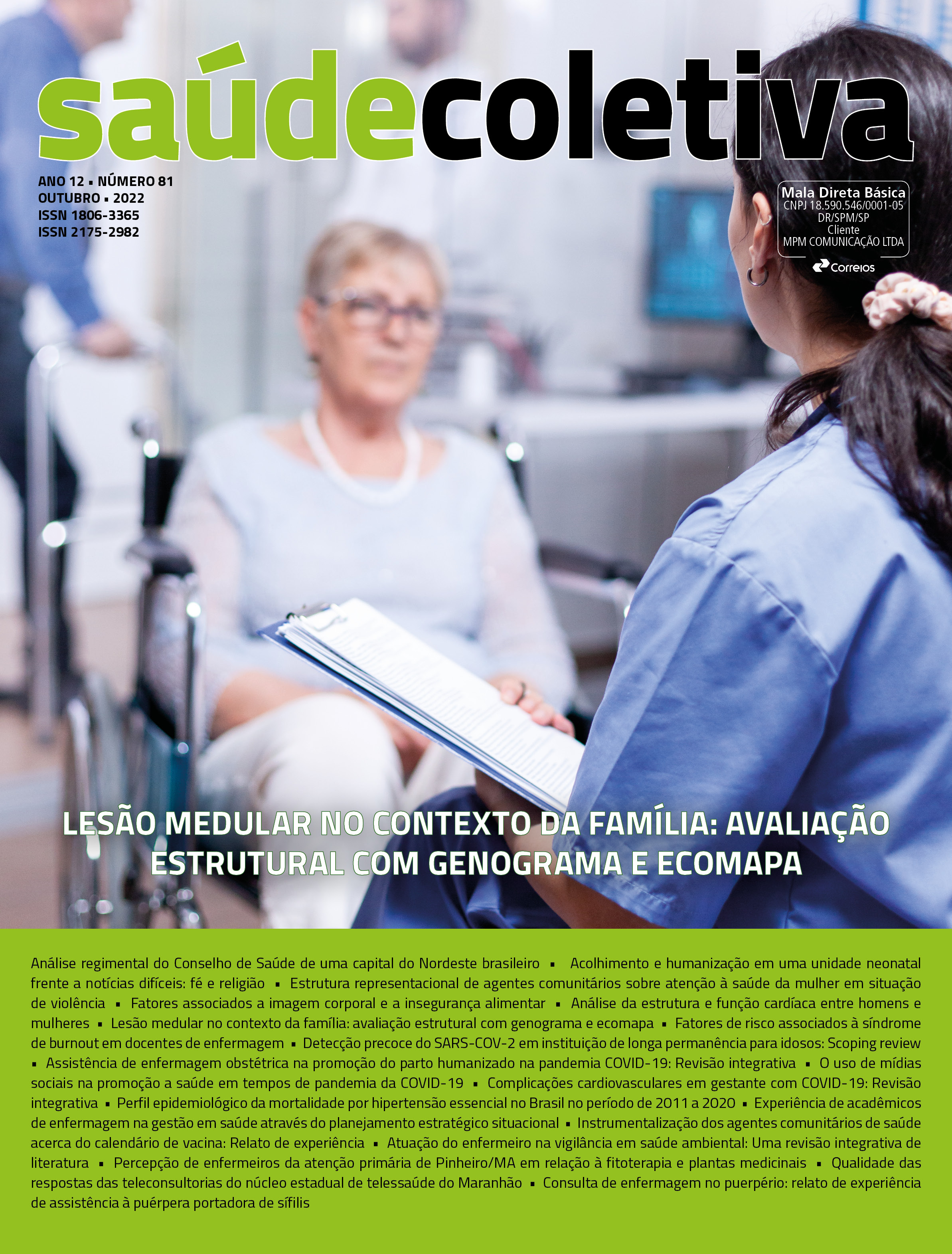The use of social media in health promotion in time of the COVID-19 pandemic
DOI:
https://doi.org/10.36489/saudecoletiva.2022v12i81p11640-11653Keywords:
Covid-19, Social Media, Health PromotionAbstract
Objective- to verify the effectiveness of social media in promoting health in the time of social isolation caused by the COVID-19 pandemic. Methods- integrative review of literature on the importance of social measures for health promotion during the new Coronavirus pandemic. Forms made to search the VHL portal, the LILACS and MEDLINE databases and the NCBI portal, the PubMed. Results- nine articles were selected, all of which were published in 2020 and in English. Six studies were indexed to the Medline/Pubmed database. The various social media found in the studies (You tube, Facebook, Twitter, WeChat, Web, among others), showed a wide reach and influence in health promotion during the pandemic of the new Coronavirus. Conclusion- I conclude that social media play an important and effective role in promoting health during the social isolation caused by the COVID-19 pandemic. That is mainly seen hair reaching a large number of people presented by them.
References
Serviço G do E de P, others. Protocolo de tratamento do Novo Coronavírus (2019-nCoV). 2020;
de Castro AA, Maia RKS, Walter PAL, de Oliveira Borges EC. A PANDEMIA POR COVID-19 E SUAS REPERCUSSÕES SOCIAIS, ECONÔMICAS E POLÍTICAS SOBRE BOA VISTA-RR (MAR.–JUN., 2020). Ambiente: Gestão e Desenvolvimento. 2020;110–39.
Cui J, Li F, Shi ZL. Origin and evolution of pathogenic coronaviruses. Nature reviews microbiology. 2019;17(3):181–92.
Huang C, Wang Y, Li X, Ren L, Zhao J, Hu Y, et al. Clinical features of patients infected with 2019 novel coronavirus in Wuhan, China. The lancet. 2020;395(10223):497–506.
Wang C, Horby PW, Hayden FG, Gao GF. A novel coronavirus outbreak of global health concern. The lancet. 2020;395(10223):470–3.
Xavier F, Olenscki JRW, Acosta AL, Sallum MAM, SARAIVA A. Análise de redes sociais como estratégia de apoio à vigilância em saúde durante a Covid-19. Estudos avançados. 2020; 34:261–82.
de Sousa Martins E, Ono BHVS, carlos Souza J, Menin IBF, others. Mídia e promoção da saúde em tempos de COVID-19. Research, Society and Development. 2020;9(8):e842986252–e842986252.
Silveira RC de CP, Galvão CM. O cuidado de enfermagem e o cateter de Hickman: a busca de evidências. Acta Paulista de enfermagem. 2005; 18:276–84.
Galvão CM, Sawada NO, Trevizan MA. Revisão sistemática: recurso que proporciona a incorporação das evidências na prática da enfermagem. Revista Latino-americana de enfermagem. 2004; 12:549–56.
Mendes KDS, Silveira RC de CP, Galvão CM. Revisão integrativa: método de pesquisa para a incorporação de evidências na saúde e na enfermagem. Texto & contexto-enfermagem. 2008; 17:758–64.
Galvão C, Mendes K, Silveira R. Revisão integrativa: método de revisão para sintetizar as evidências disponíveis na literatura. Brevidelli MM, Sertório SCM Trabalho de conclusão de curso: guia prático para docentes e alunos da área da saúde São Paulo: Iátrica. 2010;105–26.
Whittemore R, Chao A, Jang M, Minges KE, Park C. Methods for knowledge synthesis: an overview. Heart & Lung. 2014;43(5):453–61.
Karino ME, Felli VEA. Enfermagem baseada em evidências: avanços e inovações em revisões sistemáticas. Ciência, Cuidado e Saúde. 2012; 11:011–5.
Varela J. Blogs vs. MSM. Periodismo 3.0, la socialización de la información. Telos: Cuadernos de comunicación e innovación. 2005;(65):68–76.
Kotler P. Marketing 4.0 Do tradicional ao digital. 2021;
Allcott H, Gentzkow M. Social media and fake news in the 2016 election. Journal of economic perspectives. 2017;31(2):211–36.
Al-Dmour H, Salman A, Abuhashesh M, Al-Dmour R, others. Influence of social media platforms on public health protection against the COVID-19 pandemic via the mediating effects of public health awareness and behavioral changes: integrated model. Journal of medical Internet research. 2020;22(8):e19996.
Li X, Liu Q, others. Social media use, eHealth literacy, disease knowledge, and preventive behaviors in the COVID-19 pandemic: Cross-sectional study on Chinese netizens. Journal of medical Internet research. 2020;22(10):e19684.
Basch CE, Basch CH, Hillyer GC, Jaime C. The role of YouTube and the entertainment industry in saving lives by educating and mobilizing the public to adopt behaviors for community mitigation of COVID-19: successive sampling design study. JMIR public health and surveillance. 2020;6(2):e19145.
Yousuf H, Corbin J, Sweep G, Hofstra M, Scherder E, Van Gorp E, et al. Association of a public health campaign about coronavirus disease 2019 promoted by news media and a social influencer with self-reported personal hygiene and physical distancing in the Netherlands. JAMA network open. 2020;3(7):e2014323–e2014323.
Chu WM, Shieh GJ, Wu SL, Sheu WHH, others. Use of Facebook by academic medical centers in Taiwan during the COVID-19 pandemic: observational study. Journal of medical Internet research. 2020;22(11):e21501.
Zhou L, Xie R hua, Yang X, Zhang S, Li D, Zhang Y, et al. Feasibility and preliminary results of effectiveness of social media-based intervention on the psychological well-being of suspected COVID-19 cases during quarantine. The Canadian Journal of Psychiatry. 2020;65(10):736–8
Ahmed W, Vidal-Alaball J, Lopez Segui F, Moreno-Sánchez PA. A social network analysis of tweets related to masks during the COVID-19 pandemic. International Journal of Environmental Research and Public Health. 2020;17(21):8235.
Chao M, Xue D, Liu T, Yang H, Hall BJ. Media use and acute psychological outcomes during COVID-19 outbreak in China. Journal of anxiety disorders. 2020; 74:102248.
Mira JJ, Vicente MA, Lopez-Pineda A, Carrillo I, Guilabert M, Fernández C, et al. Preventing and addressing the stress reactions of health care workers caring for patients with COVID-19: Development of a digital platform (Be+ Against COVID). JMIR mHealth and uHealth. 2020;8(10):e21692.







